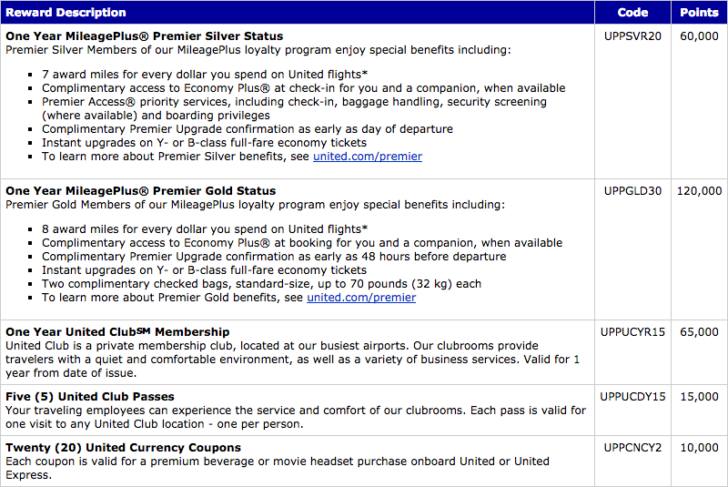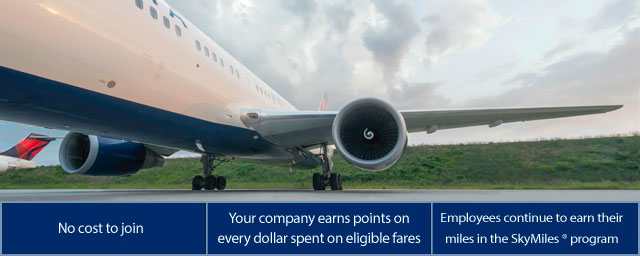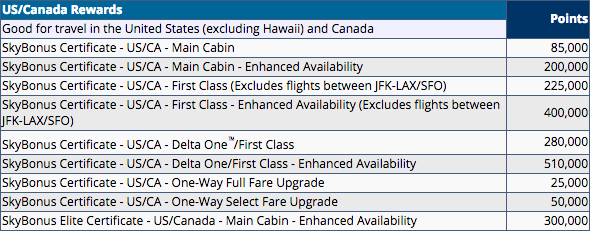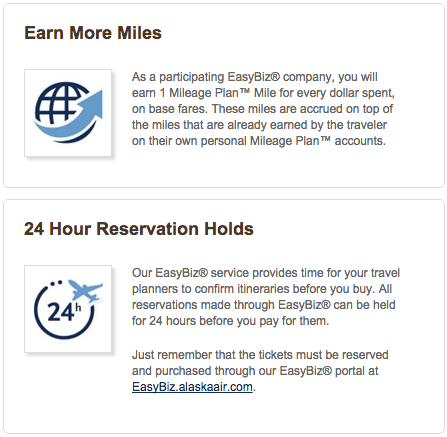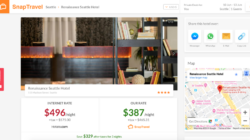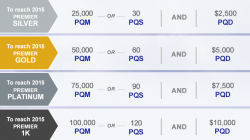Almost every major domestic airline operates a separate program for businesses and business travelers. These may include additional loyalty benefits, special discounts, or just ways of tracking and monitoring your business travel. Some of these airlines are also including international partners to expand their reach.
My own small business (this blog) has been able to earn one free domestic round-trip each year. That doesn’t sound like much but remember, the majority of that is my own travel. As you add more employees the rewards can accumulate faster. The business can then dole them out as incentives or whatever it finds appropriate; employees continue to earn the same rewards as always through their personal accounts.
Distinct Programs from Legacy Carriers
United Airlines, American Airlines, and Delta Air Lines each operate a completely separate loyalty program for small businesses. These are revenue based and earn “points” based on the value of the tickets you purchase.
American Airlines – Business Extra
Business Extra is a fairly simple program to grasp: Earn 1 point per 5 dollars on all tickets. British Airways and Iberia recently merged their program with Business Extra, so you can earn points on tickets issued by any of these three carriers. In addition, you can earn Business Extra points on flights ticketed by American Airlines but operated by Finnair, Japan Airlines, or Qantas. (How do you tell if it was ticketed by AA? Either buy it from them or make sure the ticket number starts with “001”.)
Points can be redeemed for PlanAhead awards (essentially MilesSAAver awards, except you’re not earning miles) or Anytime awards, starting at just 2,000 points for a domestic flight. I appreciate that the chart doesn’t necessarily charge double for first class awards; these are just 3,200 points. You can also redeem for AAdvantage Gold status, lounge access, or upgrades.
United Airlines – PerksPlus
PerksPlus has a complicated system of awarding points based on a combination of factors that include spend, fare class, and route. At the base level you’ll always receive a minimum of 1 point per dollar for discounted economy class flights between hub airports. Full-fare economy and discounted first or business class fares earn 2 points, and more expensive first and business class fares earn 3 points. Double these numbers if you’re departing from a non-hub airport. For reference, United’s hub locations are San Francisco (SFO), Los Angeles (LAX), Denver (DEN), Chicago (ORD), Houston (IAH), Newark (EWR), Washington (IAD), Guam (GUM), and Tokyo (NRT)
Points can be earned when flying on United, Lufthansa, Swiss, Austrian, and Brussels, so you’ll have several options in the U.S. and Europe to continue earning through PerksPlus.
PerksPlus rewards are more expensive than on American, but that’s because you’re earning more points. They can also be less restrictive. For example, the cheapest economy class domestic award costs 35,000 points but books into the K class — not a standard award booking class. Other benefits include Premier Silver or Gold elite status, lounge access, and drink coupons.
Delta Air Lines – SkyBonus
Like United’s PerksPlus, SkyBonus points are awarded with respect to the price paid, the fare class, and the origin/destination airport. Qualifying travel can be marketed by Delta, KLM, Air France, or Alitalia.
So-called “Level 1” fares include all first, business, Comfort+, and premium economy fares. Full-priced economy fares (Y and B) are also included. These earn 10 points per dollar for travel to/from Atlanta (ATL), Cincinnati (CVG), Detroit (DTW), Minneapolis (MSP), and Salt Lake City (SLC). Other economy class fares earn just either 3 points per dollar (Level 2) or 1 point per dollar (Level 1).
If you aren’t traveling to/from those hub cities, then you’ll earn 30 points per dollar on Level 1 fares, 6 points per dollar on Level 2 fares, and 3 points per dollar on Level 3 fares. Level 3 is a recent addition that includes the most discounted fares such as Delta’s Basic Economy fare, which excludes upgrades and preferred seating even for elite members.
Delta may not publish it’s own award chart anymore, but it does publish a chart for SkyBonus. And as you’d expect they are highly segmented by route, cabin class, and flexibility. A basic Main Cabin award costs 85,000 points or 200,000 if you want enhanced availability.
SkyBonus doesn’t just earn rewards — you can also earn SkyBonus elite status when you accumulate a minimum of 2,000,000 points each year. Benefits include:
- 10% bonus points
- Priority access to account representatives
- Quarterly industry reports
- Additinoal award availability
Alaska Airlines – EasyBiz
Although it doesn’t seem like a legacy carrier, in many respects Alaska is the only legacy carrier left today. It was founded in 1932 — well before Southwest — and still operates under a traditional distance-based model for accumulating and redeeming miles. That said, its EasyBiz program for small businesses has some similarities to the programs run by JetBlue’s Blue Inc., below.
EasyBiz earns regular Mileage Plan miles rather than relying on a separate points scheme. These miles are credited to the business’s account and can be used to book awards for employees. Alaska already offers a low-price guarantee to all its customers, meaning you can rebook without penalty at any time when the price of your ticket drops. However, it does make some unique accommodations for the business program. Among these is a 24-hour hold period before tickets are booked. This contrasts with the 24-hour cancellation period that Alaska normally offers (like most U.S. carriers), which requires paying first and then getting a refund if you change your mind.
Tools and Rewards from Alternative Carriers
Two of the largest upstart carriers in the U.S. have also created their own business loyalty programs. Like their consumer programs, they offer less complexity and potentially less value. However, it depends a great deal on what your travel patterns are like. An international consulting firm probably wants to look at one of the above options.
Southwest Airlines – SWABIZ
SWABIZ doesn’t actually offer any new savings to business travelers on Southwest Airlines. I guess the airline believes it does such a great job with its regular price structure that more savings aren’t necessary. It’s hard to argue with no change fees. (But I’ll try anyway. Southwest just makes you buy up to the prevailing last-minute fare.)
The program seems more interested in making it easier for company travel managers to monitor their expenses. That said, it does claim to provide “access to SWABIZ exclusive promotions and offers.”
JetBlue – Blue Inc.
JetBlue does Southwest one better, providing a booking and tracking platform in addition to 3 TrueBlue points per dollar spent through Blue Inc. The company can then redeem its TrueBlue points for any of its travelers. Employees continue to earn 6 TrueBlue points per dollar in their personal accounts. Overall it’s a simple but rewarding program.
Summary
If your employees were to spend $20,000 a year on moderately expensive economy class fares (something pricey, but not a Y fare) and departed from hub airports to take advantage of non-stop flights, how would the points earned compare across each program?
- American Business Extra: 4,000 points
- United PerksPlus: 40,000 points
- Delta SkyBonus: 60,000 points
- Southwest SWABIZ: n/a
- JetBlue Blue Inc.: 60,000 points
How far these rewards take you, however, depend a lot on what you want to do with the rewards. Are you just going to hand out lounge passes and upgrades, or do you want to be able to provide elite status and free tickets?
Like their consumer loyalty programs, the legacy carriers have generally created complicated systems for their business travel programs. American’s Business Extra is actually quite simple on the earning side, but redemption still involves several different charts. In addition, the added complexity of Delta and United’s earning structure seems to do a better job of tracking the profitability of each fare, which could be viewed as a plus to those who buy more expensive tickets.
JetBlue, matching the simplicity of its consumer program, provides benefits that are more closely viewed as cash back. Blue Inc. has the benefit of not reinventing the wheel — companies are essentially getting their own TrueBlue accounts that work in much the same way. Southwest doesn’t do much.





